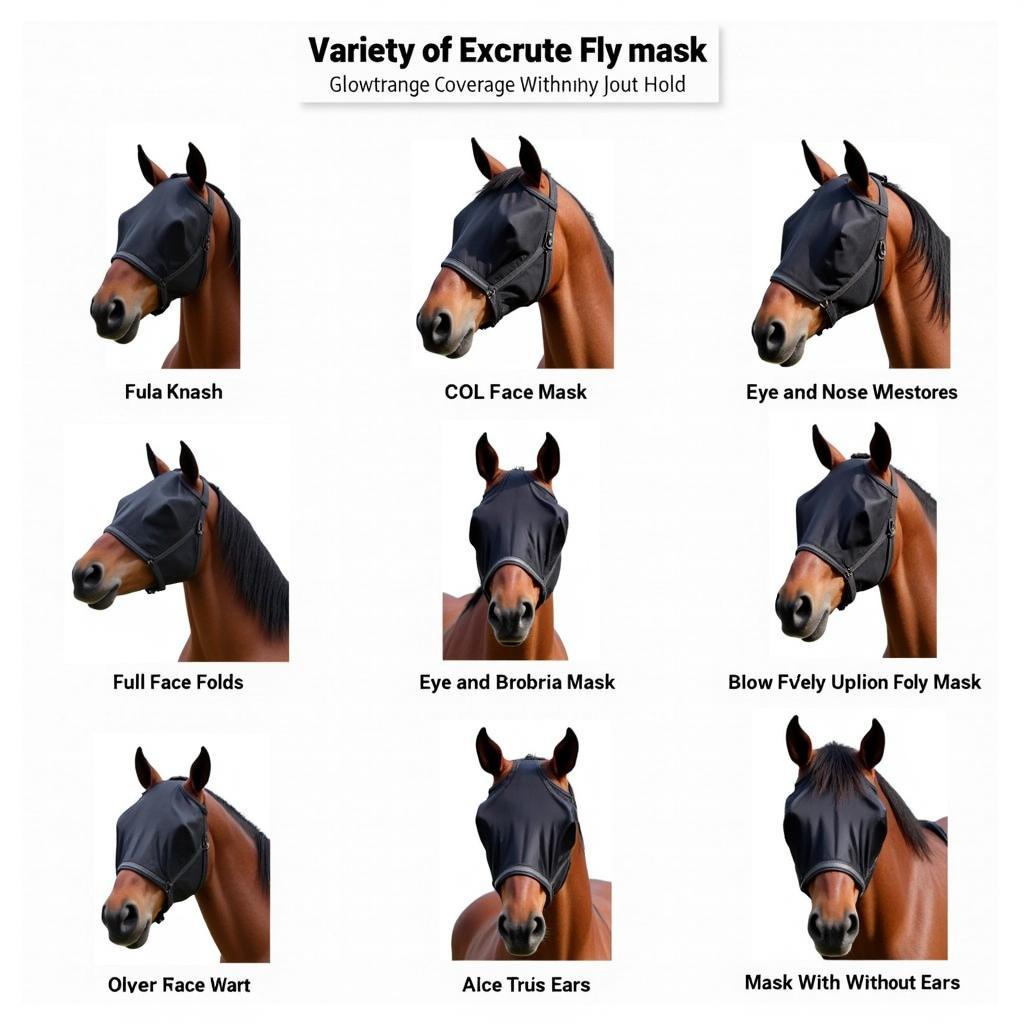A fly mask is a must-have for horse owners who want to protect their equine companions from pesky insects during the warmer months. But with so many different types of fly masks on the market, it can be tough to know which one is right for your horse. This comprehensive guide will cover everything you need from understanding why fly masks are important to choosing the perfect one.
Why Use a Fly Mask on a Horse?
Flies aren’t just annoying, they can pose serious health risks to your horse. Here’s why a fly mask is an essential piece of horse tack:
- Protection from Flies and Insects: Fly masks create a barrier around your horse’s eyes and face, shielding them from pesky insects like flies, mosquitoes, gnats, and other flying insects. These insects can cause irritation, allergic reactions, and transmit diseases.
- Prevention of Eye Irritations and Infections: Horses are particularly susceptible to eye infections and irritations caused by dust, debris, and UV rays. Fly masks with UV protection help minimize the risk of these issues.
- Reduction of Stress and Discomfort: Constant swatting at flies with their heads and tails can be incredibly stressful for horses. Fly masks offer relief from these distractions, allowing them to graze and relax peacefully.
Types of Fly Masks for Horses
Fly masks come in a variety of styles to cater to different needs and preferences. Here are some common types:
- Full-Face Fly Masks: As the name implies, these masks offer the most comprehensive protection, covering the horse’s entire face, including the eyes, ears, and nostrils.
- Eye and Nose Fly Masks: These masks focus on protecting the eyes and nose while leaving the ears uncovered. They are suitable for horses that are bothered by flies around their eyes and face but don’t mind them near their ears.
- Ear Fly Masks: Designed specifically to shield a horse’s sensitive ears from flies and other insects. They often feature long, mesh or fabric ears that drape over the horse’s ears.
- UV-Protective Fly Masks: These masks incorporate materials that block harmful UV rays, protecting your horse’s sensitive skin from sunburn and potential long-term damage.
 Different Types of Fly Masks
Different Types of Fly Masks
Choosing the Right Fly Mask: Factors to Consider
Selecting the right fly mask is crucial for your horse’s comfort and well-being. Consider these factors when making your choice:
- Size and Fit: A well-fitting fly mask should sit comfortably on your horse’s face without being too tight or too loose. Measure your horse’s face carefully, referring to sizing charts provided by different manufacturers.
- Material: Fly masks are typically made from mesh or fabric. Mesh masks offer excellent ventilation, while fabric masks provide greater durability.
- Visibility: Opt for masks with clear or fine mesh around the eye area to ensure optimal visibility for your horse.
- Durability: Choose a mask made from high-quality materials that can withstand regular wear and tear.
- UV Protection: If your horse is particularly sensitive to the sun or spends long hours outdoors, consider a fly mask with UV protection.
Tips for Using a Fly Mask on a Horse
- Introduce the Mask Gradually: Let your horse sniff and investigate the fly mask before attempting to put it on. Start by putting the mask on for short periods and gradually increase the duration.
- Check the Fit Regularly: Make sure the fly mask is still fitting properly and hasn’t shifted or become loose, especially after activities like rolling or grazing.
- Clean the Mask Frequently: Dirt, debris, and sweat can accumulate on the mask, so it’s essential to clean it regularly according to the manufacturer’s instructions.
Fly Mask on Horse FAQs
Q: How long can a horse wear a fly mask?
A: Horses can wear fly masks for extended periods, even throughout the day, especially during peak fly season. However, it’s crucial to remove the mask at least once a day to check for any rubs, sores, or discomfort.
Q: Can I leave a fly mask on my horse at night?
A: It’s generally not recommended to leave a fly mask on your horse at night. Horses need to be able to see clearly in low-light conditions, and a fly mask can obstruct their vision.
Q: What should I do if my horse rubs its face with a fly mask on?
A: If your horse is rubbing its face excessively, remove the mask immediately and check for any signs of irritation or injury. The mask may fit improperly or have rough edges that are causing discomfort.
Need Help Choosing the Perfect Fly Mask?
At Justus Horses USA, we’re committed to providing horse owners with the information and resources they need to provide the best possible care for their equine companions. If you have any further questions about fly masks or need assistance choosing the right one for your horse, don’t hesitate to contact our expert team at 0772127271, email us at [email protected], or visit us at QGM2+WX2, Vị Trung, Vị Thuỷ, Hậu Giang, Việt Nam. We’re here to help 24/7!